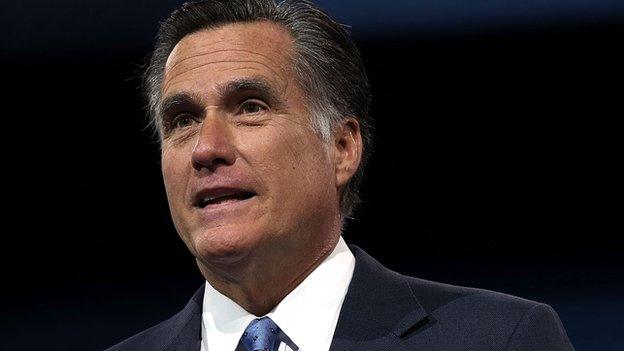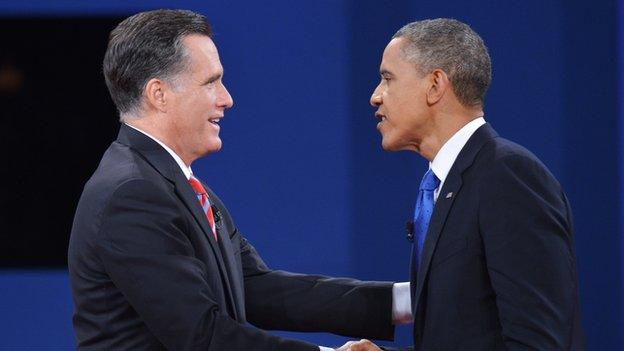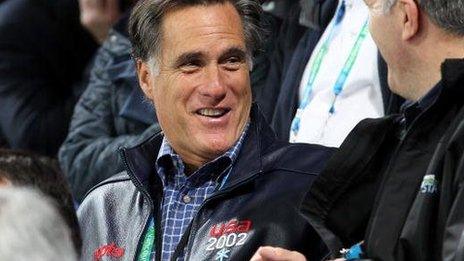A Mitt Romney presidential sequel in 2016?
- Published
- comments

A recent poll, external that contained some disturbing news for President Barack Obama concerning low approval ratings had a nugget that might provide a smile for his 2012 opponent.
According to a Quinnipiac University survey, 44% of Americans think the country "would be better off than it is today" if Mitt Romney were president today, versus 38% who say the nation would be in worse shape.
These numbers have stoked speculation on whether Mr Romney could be considering another try for the presidency in 2016.
It would be an unusual move, as most defeated candidates in the general election tend to disappear from the national political scene - or at least give up on their presidential aspirations.
"Romney recognises well the historical odds against becoming a repeat nominee," writes, external former Romney campaign lawyer Emil Henry in Politico magazine. "In the film Mitt, which documents his two presidential campaigns, he is captured at a fundraiser making an 'L' on his forehead to depict how a failed nominee becomes 'a loser for life.'"
Henry - a former George W Bush administration treasury department official - argues, however, that Mr Romney's situation is more like that of Richard Nixon, who was defeated by John Kennedy in 1960 only to turn around and win the top job in 1968.
He says both politicians were "mighty warriors" who lacked an easy appeal on television. Nixon shook off his critics, however, and persevered. Could Mr Romney be cut from similar cloth?
There are three factors that could contribute to a Romney resurgence similar to Nixon's, Henry writes. Mr Romney has emerged as the de facto leader of an otherwise rudderless Republican party. Former Florida Governor Jeb Bush and New Jersey Governor Chris Christie - two possible competitors - both have political baggage that makes them less appealing, Henry asserts.
This dearth of leadership is matched by a lack of appealing presidential candidates, Henry says. The nomination was wide open for Nixon in 1968, and the same could be said for Mr Romney.
"Romney, like Nixon, will have a massive legacy infrastructure at his disposal to seize the opportunity," he writes. "Impressively, Romney is the only Republican who can roll into any major money centre like New York, Los Angeles or Houston and mobilise his fundraisers on demand, and he is doing so with regularity."
Finally, Henry says, Mr Romney is not a career politician. His appeal is that he is a competent executive and manager, which is something Americans could value come 2016.
While Henry isn't alone in speculating on a possible Romney run, other commentators have downplayed his chances.
Henry's piece "reflects the same sort of disillusion thinking that lead many in the Romney camp to argue he would beat President Obama in 2012, despite a flood of polls in key swing states that suggested otherwise," writes, external the Washington Examiner's Philip Klein.
The difference between Nixon and Mr Romney is Nixon lost a very narrow election to Kennedy, Klein continues.
Mr Romney, on the other hand, was soundly beaten.
Klein also downplays the role Mr Romney plays in the current Republican party, asking: "When was the last time an elected Republican, GOP candidate or conservative activist said to themselves: 'I wonder what Mitt Romney thinks on this issue' before taking a position?"
Commentary Magazine's Seth Mandel writes, external that Henry is wrong about the state of the Republican presidential field. Although it is fractured, that's a result of its strength, not weakness:
The field of possible 2016 candidates is far more dynamic and in line with the party's emerging identity than the 2012 field. Romney was preferable even to many conservatives over Newt Gingrich, Ron Paul and Rick Santorum. It's doubtful the same would be said for Scott Walker, Marco Rubio, Rand Paul, Mike Pence or Bobby Jindal.
He says that the recent Quinnipiac poll is reflection of "buyer's remorse" about Mr Obama and not evidence of a groundswell of Romney support.

Have Mitt Romney's presidential ambitions survived his loss to Barack Obama in 2012?
"Just because they wish someone else had won in 2012 doesn't mean they would prefer Romney to someone who isn't Obama in a future election," he says. "Buyer's remorse doesn't really work that way."
Mr Romney has denied any interest in another campaign, which is exactly why the Romney speculation has gained steam, the Washington Post's Chris Cillizza writes, external.
"Remember how Al Gore suddenly became a figure of maximum intrigue in the political world just a few years removed from losing an ultra-winnable presidential race in 2000?" he asks. "He did it by making clear he didn't want to run. Works every time."
As soon as Mr Romney throws his hat into the ring, Cillizza argues, all his old critics would emerge - with the added ammunition provided by his failed 2012 campaign.
So what to make of the Romney boomlet? Whether it's because of the field's strength or its weakness, the truth is that there is no heir apparent to the Republican nomination - a situation the party hasn't found itself in for decades.
Until a candidate breaks from the pack, Mr Romney's two key strengths - name recognition and money - are enough to keep his name in play.
Could he be the next Richard Nixon?
If nothing else, it's a remarkable commentary on our political times that "being the next Richard Nixon" has become a mantle any politician might want to claim.
- Published12 February 2014
